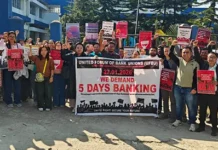[ Sachin Rana ]
On Thursday, one learned personality shared his thoughts, based on his work experience, in an esteemed newspaper of Arunachal Pradesh, about instances of law and order issues and the inherent challenges in managing the same. It is to be extolled that he did not shy away from proposing the solution as well.
As highlighted in the article, the reasons for enforcing bandhs to disturb the tranquillity of the city are enumerated as historical factors, ignorance of law, weakness of the government to succumb to such pressure, and lastly, weak and selective response of the law enforcement agency.
Broadly, I couldn’t agree more with the fact that people with vested interests in various groups and organisations are the undercurrent behind bandhs.
However, the commissionerate system of police administration in the Itanagar Capital Region (ICR) was touted as the panacea for law and order situations or the bandh calls. However, for me, it is like treating the symptoms rather than the cause.
The article contained the phrases “confusion between the executive magistrates and police officers,” “quickest decision-making,” “single authority,” “prompt decision and action,” “present system – obsolete,” and “differences in individual perspectives and the working environment of the administration and police department” to support the argument in favour of the proposed system. However, in my considered opinion, the solution offered by the author is restricted by bounded rationality, if not wrong.
Most important, the democratic virtues as provided in the Constitution of India, our country, allow us to have and express dissent. Staging a peaceful protest is the right of every citizen and it must be facilitated to have a diverse yet unified society. As they say, “Protests are the hallmarks for a vibrant democracy.”
Many a time, bandh calls have been exercised in Itanagar city in the last few years, but there were specific reasons for the same. It was not just a law and order issue.
The government, as stated in the article, has articulated and negotiated with the dissenting voices and also has come to a solution every time. It has successfully brought the distributaries back to the mainstream. However, assuming the same as the weakness of the government is uncalled for by any civil servant, and in my belief, the government of the day needs to be more accommodative and such negotiations are just the cogs of a bigger system to run holistically.
Another point raised in the article was the challenges of the ‘dual command structure’, wherein the district magistrate and the SP have the responsibility to ensure public order. The alleged confusion, if any, should be removed by these capable officers as soon as possible, and a clear plan should be made, so as to ensure law and order management.
In the recent APPSC scam and the subsequent bandh call, such confusion was not found, and the situation was managed professionally by all the responsible officers, including this author.
‘Quickest decision-making’ in the commissionerate system may be identified as one of the virtues, but it has a lacuna too. In the well-known book Thinking, Fast and Slow, author Daniel Kahneman takes us on a groundbreaking tour of the mind and explains the two systems that drive the way we think.
System 1 is fast, intuitive, and emotional, whereas System 2 is slower, more deliberative, and more logical. Kahneman reveals where we can and cannot trust our intuitions and how we can tap into the benefits of slow thinking. Law and order maintenance is one such instance. He further offers practical and enlightening insights into how choices are made in both our professional and personal lives, and how we can use different techniques to guard against the mental glitches that often get us into trouble.
I shall encourage all the readers to go through the book once, so that the thinking process can be understood by all.
‘Single authority’, as suggested in the article, seems alarming to me, as in the current level of democratic development and welfare-oriented government, such concentration of powers, that too in times of emergent nature, may be more of a liability than an asset. I have serious reservation against creating such as position.
‘Prompt decision and action’ in the said commissionerate system also seems to be far-fetched. As highlighted in the article itself, an officer of the rank of IGP should be the head of the proposed ICR commissionerate system. The IG/commissioner of the city has to rely upon a battery of officers, such as special commissioners, additional commissioners, joint commissioners, deputy commissioners, assistant commissioners, and lastly, the station house officers. The present system only has DC-SP and ADC-DSP (SDPO) and CO- OC. And by any means this seems to be quicker and accommodative to diverse views from the civil administration.
Our country has 766 districts in total, and out of this, only 10 percent approximately has the said system and the remaining 90 percent are doing well with the time tested DC-SP system.
I agree that the ‘obsolete system of the DC and SP’ needs reforms, and time and again various administrative reforms commissions and police commissions have shared their wisdom, but the implementation of the same remains the challenge. The dearth of human and other resources can hamper any system, but it does not indicate that the old system has failed. The need is to understand the voids and fill them by making standard operating procedures for guidance of the stakeholders.
Lastly, ‘differences in individual perspectives and the working environment of the administration and police department’, as stated, do not seem to be that negative, and in my view, should remain in the system. The shared perspectives, despite being individual rational thinking and thoughts, would be a better tool to address any situation. Else the democracy should make way to autocracy.
As they say, with great power comes great responsibility. Are we equipped to offer such power to a single authority?
In addition to the above, there are several other issues in the recommended commissionerate system. Lack of public confidence in the police is the foremost in my thoughts. Since the colonial times, the police have not had the image of a pro-poor and pro-people institution. The police do not inspire public confidence in general and people generally feel more confident and welcoming to bring their grievances to the executive magistrates. Therefore, the police commissionerate system can further strengthen the narrative of a ‘police raj’. In the present-day scenario, do we really need this?
As stated above, the concentration of power, ie, giving more single authoritative powers to the police, may hamper social development. In the absence of clear norms of transparency and accountability, the autonomous police machinery may leave the police as the handmaidens of the ruling political dispensation on the one hand, and a repressive governmental machinery on the other.
Politicisation of the bureaucracy is a fact of the day. Additionally, the overlapping jurisdiction in the law would create more troubles than existing now. Even though the Supreme Court of India has made a distinction between law and order (pertaining to police) and public order (responsibility of district magistrate, these two fields are overlapping, ie, any matter which is linked to individual law and order can easily become a public order issue.
In my opinion, the need is to balance the right to protest and public order. Right to protest emanates from freedom of speech and expression of the Constitution of India, and as a democratic nation, it is expected to consider the protest legitimate. Therefore, the district magistrate having a say in public order acts as checks on the raw power of the police force and it should always be. Further, in the recent times, the prime minister, during the 56th DGPs and IGPs conference (November 2021) is said to have reinforced the need to adopt the commissionerate system in cities with a population of over 10 lakhs. But the ICR population by any standard is much less than the benchmark. Therefore, such recommendations are in vain ab initio.
Therefore, it seems doubtful that the installation of a police commissionerate alone will result in safer and better-policed cities. A lot more reforms are necessary. However, there is a need to create a strong civil society with a high level of activism and participation by non-governmental organisations. It can effectively serve as a check on police forces. As public order and police are included in the 7th Schedule of the Constitution state list, the state government is required to implement necessary police reforms, so as to make it more efficient and professional.
Technological advancements present the administration with new challenges. Therefore, the planning, governance, and delivery of numerous municipal services to a large population need the establishment of strong municipal architecture. And for this, the traditional system, which is serving more than 90 percent of the country, is better placed and allows to have diverse views.
The petition filed by Aldanish Rein, advocate on record in the Supreme Court of India, referred to an instance in Delhi where an executive magistrate (from commissionerate system) refused to accept the bond given by a person in a case relating to public breach of peace and sent him to judicial custody. The petitioner contended that the rejection of bond in such cases violated the right to life under Article 21 of the Constitution of India, as people are sent behind bars without any remedy. The bench headed by Chief Justice of the Supreme Court of India, Dipak Misra, hearing the petition said: “Can police officers act as an executive magistrate? Certainly not.” (Sachin Rana is Deputy Commissioner, ICR & Papum Pare. The views expressed are personal)





